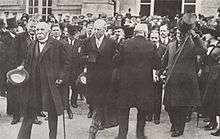Little Treaty of Versailles
Little Treaty of Versailles or the Polish Minority Treaty was one of the bilateral Minority Treaties signed between minor powers and the League of Nations in the aftermath of the First World War. The Polish treaty was signed on 28 June 1919, the same day as the main Treaty of Versailles was signed, which is the reason for one of its names. It was the first of the Minority Treaties and served as a template for the subsequent ones; together with Articles 87-93 of Treaty of Versailles, it also formally established Poland as a sovereign and independent state on the international arena.[1][2][3]
| Paris Peace Conference |
|---|
|
Treaty of Saint-Germain-en-Laye |
|
Treaty of Neuilly-sur-Seine |
|
Treaty of Trianon |

Background
Poland regained independence (as the Second Polish Republic), after 123 years of partitions, in the aftermath of the First World War. The victorious powers decided that due to significant non-Polish minorities in areas claimed by Poland (which historically controlled many Lithuanian and Ruthenian territories under the Polish-Lithuanian Commonwealth and would likely inherit a substantial German minority within its new borders) and the ongoing civilian strife caused by the local wars (in particular the Polish-Ukrainian War of 1918-1919 and Polish-Soviet War of 1919-1920), Poland had to sign the treaty in exchange for Polish independence and for Poland to sign the peace treaty with Germany (the Article 93 of the Treaty of Versailles stated that: "Poland accepts... provisions... to protect the interests of inhabitants of Poland who differ from the majority of the population in race, language, or religion").[4] In addition, the treaty declared that Poland had to take over a part of debts of Russian state and grant a most favored nation clause in transit trade to "Allied and Associated States" (Articles 14-18).
The treaty
The Polish government declared its support for "total and complete protection of life and freedom of all people regardless of their birth, nationality, language, race or religion" (Article 2) and religious tolerance (Article 7 which stated that "difference of religion, creed, or confession shall not prejudice any Polish national in matters relating to the enjoyment of civil or political rights, as for instance the admission to Public employment, functions and honors, or the exercise of professions and industries"). Provisions of the treaty "were obligations of international importance and were guaranteed by the League of Nations".
They could not be changed "without consent of majority of the League of Nations Council" (Article 12). National minorities could direct their complaints to the League of Nations Council. Difference of opinions "in legal or actual matters" between Poland and any of the western powers or any of the members of the League of Nations Council, which would result from provisions of the treaty was to have an international character (Article 12).
The treaty was signed by Polish representatives at Versailles (Roman Dmowski, Ignacy Paderewski) on 28 June 1919, the same day as the main Treaty of Versailles (hence it is known as Little or Small Treaty of Versailles. The parliament of Poland, the Sejm, ratified the treaty on 31 July 1919; the treaty was implemented on 10 January 1920. Poland renounced it at the League of Nations forum in Geneva on 13 September 1934.
See also
Notes
- Lauterpacht, Elihu Lauterpacht, C. J. Greenwood, A.G. Oppenheimer, International Law Reports, Cambridge University Press, 1998, ISBN 0-521-58070-6, Google Print, p.537
- Christian L. Wiktor, Multilateral Treaty Calendar: Répertoire Des Traités Multilatéraux, 1648-1995, Martinus Nijhoff Publisher, 1998, ISBN 90-411-0584-0, Google Print, p.188
- Thomas D. Grant, The Recognition of States: Law and Practice in Debate and Evolution, Praeger/Greenwood, 1999, ISBN 0275963500 Google Print, p.114
- See the text of the Treaty of Versailles Archived 2008-02-14 at the Wayback Machine. Note that identical requirement was given to Czechoslovakia in Article 86.
References
- Janusz Pajewski, Historia powszechna, Wydawnictwo Naukowe PWN, 2002, ISBN 83-01-13822-X
- Carole Fink, "The minorities question at the Paris Peace Conference" in The Treaty of Versailles: A Reassessment After 75 Years, Manfred Franz Boemeke, Gerald D. Feldman, Elisabeth Gläser (eds.), Cambridge University Press, 1998, ISBN 0-521-62132-1, Google Print - p.249 onward
- Carole Fink, Minority Rights as an International Question, Contemporary European History, Vol. 2 (November 2000), pp. 385–400
- Jennifer Jackson Preece, Minority Rights in Europe: From Westphalia to Helsinki Review of International Studies, Vol. 23, No. 1, pp. 1–18.
- Amber R. Ricke, THE POLISH GOVERNMENT AND ETHNIC MINORITIES:THE EFFECTS OF NATIONALISM DURING THE INTER-WAR PERIOD
- Aimee Genel, "Were the Minority Treaties a Failure?" - review of Carole Fink. Defending the Rights of Others: The Great Powers, the Jews, and International Minority Protection